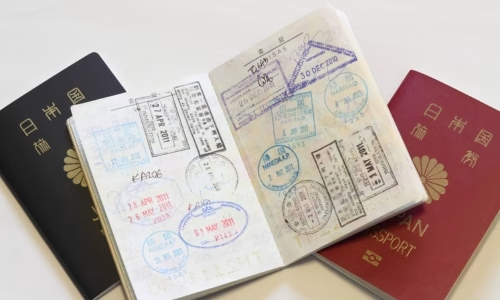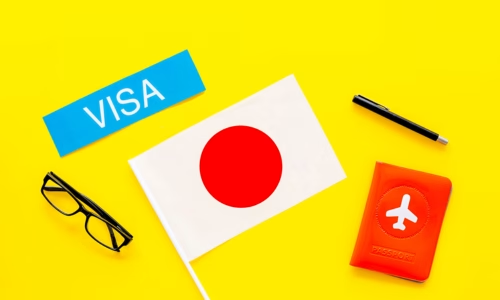The Japan dependent visa allows spouses and children of foreign residents with valid work, student, or professional visas to live in Japan. Eligible dependents include legally married spouses and children (generally under 18). Applicants need proof of relationship, sponsor’s income (recommended ¥3 million/year), and other supporting documents.
The process involves obtaining a Certificate of Eligibility, applying at a Japanese consulate, and registering after arrival.
Family members may engage in part-time employment if they obtain official authorization. Proper preparation, such as accurate translations, early applications, and sufficient financial proof, ensures a smoother process and supports family integration into Japanese life.
What This Guide Covers
If you’re considering a move to Japan for employment and plan to bring your spouse or children with you, getting familiar with the Japan dependent visa process is crucial. This visa type allows family members of foreign workers to legally reside in Japan while the primary visa holder engages in work or long-term assignments.
In this comprehensive guide, we’ll cover everything you need to know, from who qualifies for a dependent visa to the documentation required, application steps, and common pitfalls to avoid. Whether you’re relocating to Tokyo, Osaka, or a smaller city, understanding the procedure in advance can significantly reduce stress and delays.
We’ll also provide helpful tips for submitting your application through the appropriate immigration channels, advice on how to gather necessary paperwork efficiently, and insight into what to expect after arrival, such as residence registration, healthcare enrollment, and school options for children.
By the end of this article, you’ll have a clear roadmap to navigate Japan’s dependent visa system, helping ensure a smooth transition for you and your loved ones as you start your new life abroad.

Why Family Sponsorship Is Important in 2025
As Japan continues to attract global talent to support its aging workforce and labour gaps, more professionals are relocating under the Japan work visa program. For many, the opportunity to bring spouses and children isn’t just a preference, it’s a priority. Being able to live with family members plays a vital role in maintaining emotional balance, enhancing quality of life, and adapting smoothly to a new culture.
In 2025, immigration policies have evolved to better accommodate family unity. Dependent visa pathways have become more transparent and efficient, making it easier for foreign workers to sponsor their loved ones. This reflects a broader effort by the Japanese government to not only fill talent shortages but also to create a more welcoming environment for long-term expatriate residents.
Allowing families to live together fosters greater stability, reduces isolation, and improves the likelihood that skilled professionals will stay in Japan for the long term. For both individuals and employers, family sponsorship is no longer just a benefit; it’s a strategic factor in global mobility and workforce retention.

Guide to Japan’s Dependent Visa
A dependent visa in Japan is a residence status granted to the legally recognised spouse or child of a foreign national who holds a valid mid- to long-term visa, such as a work visa, student visa, or highly skilled professional visa. This visa allows family members to live together in Japan and benefit from the country’s social infrastructure, including access to public healthcare, schooling for children, and residency rights.
While the dependent visa does not automatically permit full-time employment, it offers a stable legal framework for families to stay united. In some cases, visa holders may apply separately for permission to engage in part-time work, subject to approval by immigration authorities.
Many expatriates view the dependent visa as an essential tool for smooth relocation, especially during the early stages of settling into Japanese life. It supports family integration, emotional well-being, and long-term planning, making it an important option for those seeking both career and personal fulfillment while living abroad.
Who Qualifies as a Dependent?
The Japan dependent visa is strictly limited to immediate family members of the primary visa holder. To qualify, the applicant must fall into one of the following categories:
- Spouse – The applicant must be legally married to the foreign resident working or studying in Japan. Common-law partners or fiancés are not eligible under this visa type.
- Children – Generally, children must be under the age of 18, though in some cases, dependents up to 20 years old may qualify if they are still enrolled in school or pursuing education in Japan.
Extended family members, including parents, siblings, grandparents, or other relatives, are not eligible to apply under the dependent visa category. They must explore other visa routes if they wish to reside in Japan.
Documents Needed to Sponsor Family in Japan
If you plan to sponsor your spouse or children to live with you in Japan, it’s important to prepare a complete and accurate application. Below is a breakdown of the essential documents you’ll need for a smooth visa process:
Proof of Relationship
To verify your legal relationship with the dependent:
- Provide a marriage certificate when sponsoring your spouse
- Submit your child’s birth certificate for dependent applications
- Include official Japanese translations for all foreign documents, done by a licensed translator or notary
Visa Holder’s Status & Income
To prove your eligibility as the sponsor:
- Provide photocopies of both your residence card and passport
- Certificate of employment issued by your company or organization
- Proof of annual income (recommended: over ¥3 million/year to demonstrate financial stability)
Financial Capability
To support your ability to provide for your dependents:
- Recent bank statements
- Latest tax returns or tax payment certificates
- Provide your signed work contract or official job offer letter
Additional Documents
These may be required depending on your circumstances:
- Letter of guarantee confirming financial and legal responsibility
- Family registry (koseki tohon) if your spouse or child is of Japanese descent or if required for additional verification.
Ensure all documents are up to date and consistent with your current address and employment details. Incomplete or mismatched paperwork may cause delays or rejections.
Step-by-Step: Japan Dependent Visa Application Process
Bringing your family to Japan under a dependent visa involves a few essential steps. Whether you’re applying alongside your own work visa or sponsoring them afterward, following the correct procedure ensures a smooth and legal relocation.
Start your Certificate of Eligibility (COE) application process
If your spouse or children are currently living outside Japan, the first step is to submit a Certificate of Eligibility (COE) application at your local immigration bureau. This document confirms that your family member meets the criteria to stay in Japan.
Apply Together or After Your Visa
You can choose to include your family’s dependent visa application while applying for your own work visa or wait until you’ve arrived and settled in Japan. Both approaches are allowed under current immigration rules.
COE Processing Time
On average, processing the COE takes between 1 to 3 months, depending on the region and current workload of the immigration office. Start the application process early to prevent unnecessary setbacks.
Visa Application at Consulate
Once the COE is issued, your family member must take it to the Japanese consulate or embassy in their country of residence to apply for the dependent visa.
Apply for Status Change (if in Japan)
If your spouse or child is already in Japan on a temporary status (such as a tourist visa), they can apply for a status change at the immigration office without needing to leave the country.
Receive Visa & Travel
Once approved, your dependent can travel to Japan. After arrival, they must complete residence registration at the local ward or city office within 14 days of moving into a permanent address.
Employment Rules for Japan Dependent Visa Holders
Dependent visa holders are not allowed to work full-time by default. However, they may apply for part-time work permission (資格外活動許可) at the immigration office, which allows up to 28 hours per week.
Important: Working without proper authorization can lead to penalties, visa revocation, or future visa restrictions.
What to Do After Arrival
Once your family members arrive in Japan, there are several important steps they must complete to fully integrate into daily life and remain compliant with local regulations:
- Register Your Address: Within 14 days of settling into a residence, dependents must report their new address at the nearest ward or city office. This registration updates the national residency records.
- Enroll in National Health Insurance: After registering their address, your spouse or children must join Japan’s National Health Insurance (NHI) system, which covers a significant portion of medical expenses.
- Apply for a MyNumber (Individual Tax ID): Each resident receives a MyNumber card, used for tax, pension, and social security purposes. The application is usually processed after address registration and mailed to your home.
- Enroll Children in School (If Applicable): If your children are of school age, you should consult the local board of education to enroll them in a public or private school. Language support is often available in urban areas.
Completing these steps promptly helps ensure your family can access healthcare, education, and public services without interruption.
Tips to Avoid Common Pitfalls
Applying for a Japan dependent visa can go smoothly if you’re well-prepared. Below are some of the most frequent mistakes applicants make, and how to avoid them. Common Pitfalls to Watch For:
- Untranslated or Incorrectly Translated Documents: Immigration requires all non-Japanese documents to be accurately translated into Japanese. Avoid rejections by using certified translation services with official seals.
- Delayed COE Processing: The Certificate of Eligibility (COE) can take longer during peak periods or public holidays. Submit your application well in advance to prevent travel delays or missed school terms.
- Working Without Authorization: Dependent visa holders must apply for permission (資格外活動許可) before starting any part-time job. Unauthorized employment may result in serious consequences, including visa cancellation.
- Insufficient Financial Proof: Immigration authorities often review the sponsor’s income level. Ensure you can demonstrate financial stability, typically with annual earnings of ¥3 million or more, supported by tax documents or bank statements.
Family Sponsorship Checklist
Ensure all necessary documents are ready before starting the family visa application process for Japan. Use the checklist below to stay organized and prevent avoidable delays:
Sponsor’s Information Checklist
- Photocopy of your residence card and passport
- Employment certificate or official job offer letter
- Income verification documents (recommended: at least ¥3 million annually)
Proof of Relationship
- Provide a marriage certificate when sponsoring your spouse
- Submit birth certificate(s) for any dependent children
- Include certified Japanese translations for all foreign-language documents, completed by a licensed translator or notary
Financial Documents
- Recent bank statements
- Latest tax return documents or income certificates
Visa Application Essentials
- Completed Certificate of Eligibility (COE) application form
- Provide a copy of the passport for every dependent
- ID photos (per Japanese visa requirements)
Renting a House in Japan for Working Visa Japan Holders
When moving to Japan on a Working Visa Japan, securing stable housing is one of the most important steps to help you and your family settle quickly. The rental system in Japan is quite different from that of Vietnam or many other countries, so understanding the process, costs, and requirements will save you time and trouble.
The Rental Process in Japan
The typical rental process in Japan involves the following steps:
- Search through a real estate agency (不動産会社 – Fudōsan Gaisha) – This is the most common method since many properties are not publicly listed.
- Schedule property viewings – Visit in person to check the condition, location, and amenities.
- Submit a rental application – Required documents usually include your passport, residence card (or COE if you don’t have one yet), employment contract, and proof of income.
- Tenant screening & guarantor arrangement – Landlords or management companies often require a guarantor, usually through a guarantor company (保証会社).
- Sign the lease & pay initial fees – This includes deposit, key money, agency fees, and the first month’s rent.
- Receive the keys & move in.
Initial Housing Costs
In addition to monthly rent, be prepared for the following upfront expenses:
- Deposit (敷金 – Shikikin): 1–2 months’ rent, refundable after move-out (minus repair costs).
- Key money (礼金 – Reikin): 1 month’s rent, a non-refundable gift to the landlord.
- Agency fee (仲介手数料 – Chūkai Tesūryō): Usually equal to 1 month’s rent.
- First month’s rent: Paid before moving in.
- Guarantor company fee (保証料): Around 30–100% of one month’s rent.
Tip: Search for listings with no key money or reduced deposits on sites like Suumo, Homes, or GaijinPot Apartments to save on initial costs.
Special Notes for Working Visa Japan Holders
- Required documents: Landlords typically require a residence card (在留カード – Zairyū Kādo). If you’re new to Japan, a COE with your work contract may be accepted.
- Language barrier: Most rental contracts are in Japanese, so consider hiring a translator or working with an English-speaking agent.
- Lease terms: Most leases are 2 years; early termination may incur a penalty fee.
- Location considerations: In cities like Tokyo or Osaka, choose housing near convenient train lines to minimize commute time, but be aware that central areas come with higher rent.
Renting with Family on a Working Visa Japan
If you’re bringing your spouse and children on dependent visas:
- Look for larger layouts such as 2LDK or 3LDK for comfort.
- Prioritize areas with nearby schools, hospitals, and supermarkets.
- Check noise levels and neighborhood safety, especially with young children.
- Confirm whether the building allows children or pets, as some have restrictions.
Trusted Rental Platforms
- Suumo.jp – Japan’s largest property listing site.
- Arealty.jp – Offers both rental and purchase options. English-friendly listings for foreigners.
- RealEstate Japan – Specializes in serving professionals on a Working Visa Japan.
Finding housing in Japan on a Working Visa Japan requires careful preparation of documents, budget, and timing. Starting your housing search as soon as you receive your COE will speed up the process, allowing you and your family to settle into your new life smoothly.
Top Questions About Dependent Visas in Japan
Q: Can I sponsor my parents under a Japan dependent visa?
A: No. The dependent visa is only available for legally married spouses and children. Parents, siblings, or other relatives are not eligible under this category.
Q: Is my spouse allowed to work while on a dependent visa?
A: Yes, but only part-time employment is permitted. Your spouse must first apply for and receive official permission (資格外活動許可) from immigration before starting any job, up to 28 hours per week.
Q: Can the dependent visa be renewed or extended?
A: Absolutely. As long as the main visa holder (sponsor) maintains a valid status and continues to meet the income and residency requirements, the dependent visa can be renewed in line with the sponsor’s visa duration.
Conclusion
Moving to Japan on a Working Visa Japan offers an exciting opportunity, and having your family with you can make the experience even more fulfilling. With careful planning and adherence to immigration requirements, you can create a stable and enjoyable life in Japan. This guide helps you navigate the Japan dependent visa process with ease, ensuring a smooth transition for you and your loved ones.






Leave a Reply